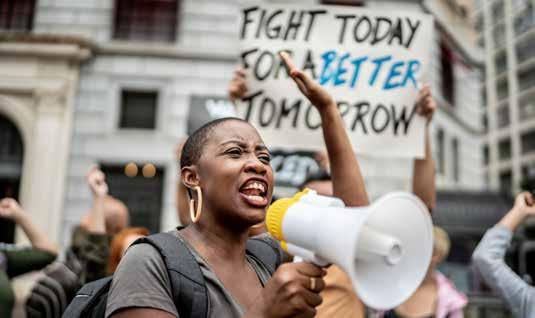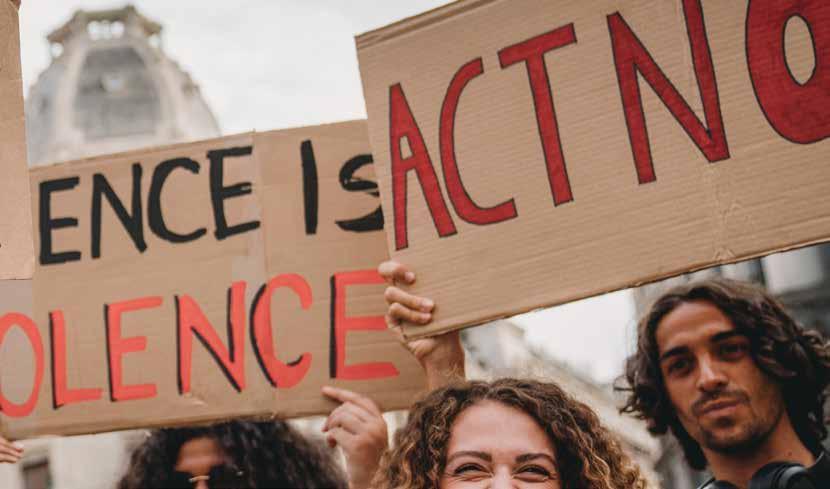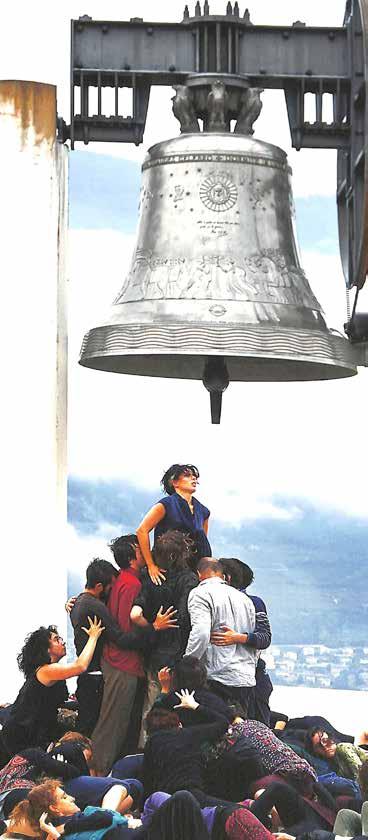Maria Dolens
Monthly newsletter from the Peace Bell Foundation



Of all the Russian citizens who could represent a real threat to President Putin’s iron leadership, until recently, Evghenji Prigozhin appeared by far the least suspicious. And not by chance. A longtime close collaborator and confidant of the “new Tsar”, to whom he had guaranteed security for years (and even some refined food), Prigozhin had over time extended his undoubted organizational skills to the military sector. Also, because coupled with a total lack of scruples as well as an equally complete indifference for human life (not including his own), Prigozhin had
turned into an invaluable agent of the Kremlin to expand the Russian sphere of influence in the world. His “Wagner militia” had in fact become an indispensable instrument of “all-round” security especially for the presidents of various Middle Eastern and African states (see the May issue of «The Voice of Maria Dolens»), willingly available to barter the protection of their positions (and their possessions) with consenting attitudes towards Moscow, in particular on the occasion of the debates at the UN concerning the Russian/Ukrainian conflict.
To be continued on page 8...
HAPPENING AT THE COUNCIL OF EUROPE

The IV Summit of Heads of State and Government of the Council of Europe was held in Reykjavík on 16 and 17 May. An event of particular importance, above all for the difficult moment that the region is experiencing after the Russian aggression against Ukraine. We asked Arturo Arcano, Chargé d’Affaires of the Italian Permanent Representation at the Coe, about the main results achieved.
«The fact that it was only the fourth summit in the more than seventy-year history of the Organization - he replied - already demonstrates the exceptional nature of the event. In Europe we are living in exceptional
and crucial times for the destiny and future order of the continent. With the decision to hold the summit, the member states of the Council of Europe wanted to reaffirm the role and political importance of the organization in defending and promoting fundamental common principles - human rights, democracy and the rule of law - heavily attacked and questioned with Russia’s aggression against Ukraine. The Council of Europe reacted immediately, under the Italian presidency it may be noted, by deciding, first on the suspension and then, on 16 March 2022, on the exclusion of the Russian Federation from the organisation. The leaders of the 46 member states, in the name of defending the fundamental princi-
ples and values they share, solemnly declared their absolute support for Ukraine and the Ukrainian people, victims of the brutal aggression. Faced with the risk of withdrawal in Europe in terms of respect for democratic principles, the summit also adopted the «Reykjavik Principles of Democracy», a catalogue of fundamental principles which should form the basis of any democratic and participatory system. The crucial role of the European Convention for the Protection of Human Rights and of the related European Court in Strasbourg was reaffirmed, as they are cornerstones in the defence of fundamental freedoms and, ultimately, of Peace and stability on the continent.
The summit also spoke on the now essential link between human rights and the environment, and on what the Council of Europe can do, within the scope of its competence, to develop the legal aspects based on the laws of the Court and their implementation currently underway in various intergovernmental bodies within the organization. A specific document attached to the leaders’ statement denounced the crime perpetrated by the Russian authorities with the forced deportation of Ukrainian children, confirming full support for Kiev for the children to return to their homeland and for those responsible for this crime to be prosecuted. Furthermore, precise and detailed measures have been defined to guarantee full respect for the rights of Ukrainian children temporarily hosted in member states, based on the vital experience of the Council of Europe in preparing guidelines for the protection of the most vulnerable subjects. And, last but not least, the leaders adopted a political declaration of support for the Register of Damage relating to the Russian aggression against Ukraine, established precisely on the occasion of the Summit and which is undoubtedly the main result».

What is the practical importance of the Register?

It is an essential means, and one of the first concrete actions of the international community, with which to hold the Russian Federation accountable for all violations perpetrated in or against Ukraine, as stated in the UN General Assembly Resolution of November 14, 2022. It is a first step towards the establishment of a compensation mechanism for damages, which the inter-
national community is discussing, and that in the future could include a commission for the assessment of compensation rights and a fund for the compensation of verified damages. Forecasts say that it could receive over 20,000 registration requests a year and for this reason we are committed to providing it with adequate human and material resources. The first meeting for the Conference of the Parties has already been held, an Executive Director has already been appointed
and resources have already been allocated for the functioning in these first months. Furthermore, in record time, the Netherlands and the Council of Europe are finalizing agreements regarding a relative centre of operations. In short, making the register immediately operational is an absolute priority of the Council of Europe. In fact, the Council of Europe wishes to make its contribution to the efforts of the international community so that victims receive an answer to their request for justice as soon as possible. It does so by offering its experience and wealth of knowledge specific to the collection of complaints, gained within the activity of the European Court and beyond.
The obligation to comply with the rulings of the European Court, expressed in article 46 of the Convention, is absolutely essential and cannot be conditioned or extenuated by any circumstance, if one wishes to preserve the credibility and stability of the entire conventional system set up to protect funda-
mental rights. This principle was clearly stated at the summit, with an ad hoc document annexed to the main declaration. It remains crucial to strengthen the mechanisms for supervising the execution of the Court’s directives, currently managed by the Committee of Ministers, first of all by favouring a cooperative approach where there are objective difficulties of the states, in their various ramifications, including judicial power. Consider above all the cases identified as structural, the implementation of which requires profound legislative or administrative changes which are not easy to put into effect and often require a long period of application. In this case, the technical assistance provided by the structures of the Council of Europe with a view to dialogue with the State may be useful. Similarly, it is vital that the platforms for meeting and dialogue between the European Court and the national High Courts be strengthened, developing initiatives such as that of the network promoted by the Council of Europe. Furthermore, the training of national judges and the dissemination of the rulings and laws of the European Court are essential.
There is obviously also a problem of a political nature, when there is a clear and persistent refusal of the obligation to comply, judicial independence is not guaranteed and the principle of the separation of powers is not fully implemented. In such cases, the Convention and its subsequent protocols provide the possibility to adopt measures against the defaulting state, but do not specify the nature and methods with which to do so in detail. These are aspects that are still open and on which a debate is set to begin following the Reykjavik summit.
How can the visibility of the Council of Europe be increased among the member states?
In fact, one of the topics currently under discussion is precisely that of increasing the visibility of the activities of the Council of Europe and, in this regard, the secretariat of the Council of Europe is implementing a communication plan, launched moreover on the impetus of our presidency, to inform not only the general public, but also those involved in this sphere, on how much the Council of Europe does to defend and promote fundamental rights and principles in Europe. It is enough to consider

the role of the European Court in promoting human rights or that of the Venice Commission which, with its “opinions” on constitutional and electoral reforms in member states, constitutes an essential point of reference in protecting the rule of law not only in Europe but globally. We might also consider the role of the benchmarks set by the Council of Europe in terms of the rule of law or the efficiency of justice with the European Commission for the Efficiency of Justice (CEPEJ), used by the European Commission to draw up its periodic assessments of respect for the rule of law in EU countries. There needs to be greater awareness of the impact on the life of European citizens of the work carried out within the framework of the Council of Europe and there is no shortage of examples: in terms of combating violence against women in the domestic sphere, the Istanbul Convention constitutes an essential cornerstone at a global level and has influenced national legislation on the subject, also through the valuable work of monitoring carried out by the group of experts on violence against women (GREVIO). We also bear in mind the Pharmacopoeia, which few know to be an inte -
gral part of the Council of Europe, and which develops quality standards on medicines and medical practices to protect the health of all European citizens and not only. The examples are endless. Of course, this information campaign can only be successful with decisive action within member states. Italy, through the work of the branch office of the Council of Europe in Venice, systematically conducts information schemes for academies and specialized study centres, also involving civil society and the world of young people.
During our 2022 presidency term, this action was particularly intense, also regarding primary schools, where information and educational material was distributed on human rights and their protection in the context of the Council of Europe. I believe that greater knowledge of the Council of Europe and its activities must be part of an overall educational strategy on the rights and duties relating to citizenship to be conducted precisely in schools and which is increasingly needed today.

 © Filippo Bacci
© Filippo Bacci

«What are the implications of the European Union’s new social media regulations for the rest of the world? ». The theme of the workshop recently held by the UN and the EU as part of the event dedicated to the Digital Services Act is thorny and complex. It’s about understanding what kind of results may be obtained in attempting to regulate the information that anyone can provide online without any control.
During a panel discussion moderated by Melissa Fleming, UN Under-Secretary-General for Global Communications, it was clear that digital platforms have brought many benefits, supporting communities in times of crisis, elevating marginalized voices and helping to mobilize global movements for racial justice and gender equality.
But at the same time, these channels are being used to subvert science, spread disinformation and hate, fuel conflict, threaten democracy and human rights, and compromise public health and climate action. According to the Secretary-General of the United Nations, António Guterres, «the ability to spread disinformation on a large scale to undermine scientifically established facts represents an existential risk for humanity».
Obviously, the only way to address a global problem must be a concerted international response that aims to apply the recommendations contained in the relative document on the integrity of information disseminated on digital platforms, which was launched by Guterres himself in past months. The plan contains proposals to make the digital space safer and more inclusive, while strongly protecting human rights. But the United Nations is also developing a “Code of Conduct” for journalists in view of the “Summit of the Future” to be held next year. The hope is to obtain significant changes from digital platforms, including the commitment to abandon harmful business models and to favour the commitment to human rights, privacy and security.
The question that remains open, however, is the usual: which institutions will be able to enforce these regulations? At the moment, it is difficult to speculate that this is possible. Of course, we must work to limit false news, but it could also be useful to “train” people to select sources and not stop at the headlines of articles. But perhaps that’s not enough either. Let’s take a concrete example: 98.6% of Italians are literate, but the percentage of citizens aged between 25 and 65 with limitations in understanding a text is closer to 30%. Who will help that 30% select news they don’t fully understand? Certainly, the Code of Conduct is a necessary condition, but at the moment it does not seem sufficient.
31 August 2014: Dance performance under the peace bell in collaboration with the Oriente Occidente festival


To be continued from page 1...
It is true that, recently, Putin’s ex-chef had taken liberties hitherto unheard of in the Russian political/military context, going so far as to publicly attack his country’s military leaders (Defence Minister Shoigu and Chief of Staff Gerasimov) with accusations of manifest ineptitude in the management of the “special operation” launched on February 24, 2022. Accusations, it is emphasized incidentally, that are not entirely unfounded, if we compare the modest results obtained on the ground with the clear Russian superiority in men, means and resources.
Commenting on the well-known events of 24 June, unimaginable until the day before, a deeper reflection leads us to believe that only the “shrewdness” of not having included the head of the Kremlin among the recipients of his anathemas, as well as the intermediation of Belarusian President Lukaschenko, has thus far saved Prigozhin’s life. But even so, his personal fate appears truly tied by a thread and the fate of his former troops uncertain between dissolution and incorporation into the regular forces with a condition of heavy subordination.

In the international arena, considering the expected reactions of solidarity with Putin from China, Iran, Qatar and other countries traditionally close to Moscow, it is significant that on both sides of the Atlantic, following this moment of surprise, the very serious insubordination of the head of Wagner has been labelled an «internal Russian affair».
With this unanimous opinion, the EU and NATO capitals not only wished to exclude their direct involvement in the affaire, but also deny that the hypothesis of a regime change in Moscow was ever hypothesized by them, not even in the frantic hours immediately following the “march of the 25,000”.
If this interpretation appears essentially correct, it would also seem erroneous to bring the Russian situation today back to the business-as-usual formula. On the domestic front, following this Saturday at the start of the summer, Putin is no longer unassailable and Prigozhin has scratched, perhaps forever, that public image of invincibility stubbornly cultivated by the former KGB official since the time of the ruthless anti-Chechen repression.
Even against the background of a Ukrainian counter-offensive that is struggling to take off, at least judging by the modest territorial reconquests of the last few weeks, in the 17 months of conflict the current moment appears to be one of the most favourable for recourse to diplomacy, rather than to the protracted use of weapons without any forecast of duration. It is a pity that such an evident principle clashes today, with the objective absence of a negotiating framework accepted by all the parties in conflict, within which to place any form, even the most embryonic, of negotiation. In this regard, we willingly place our trust in the outcomes of the “peace mission” promoted by Pope Francis and interpreted with tact and competence by Cardinal Matteo Zuppi both in Kiev and Moscow, as well as in recent days in Washington, in order to prove us wrong.
Reggente Marco Marsilli, Foundation President